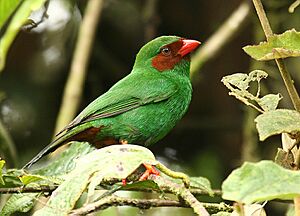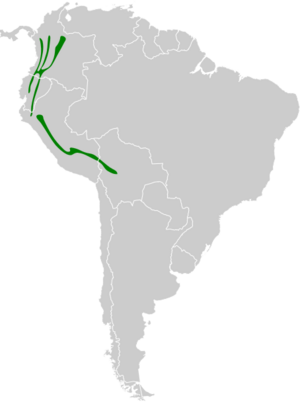Grass-green tanager facts for kids
Quick facts for kids Grass-green tanager |
|
|---|---|
 |
|
| Conservation status | |
| Scientific classification |
|
| Kingdom: | Animalia |
| Phylum: | Chordata |
| Class: | Aves |
| Order: | Passeriformes |
| Family: | Thraupidae |
| Genus: | Chlorornis Reichenbach, 1850 |
| Species: |
C. riefferii
|
| Binomial name | |
| Chlorornis riefferii (Boissonneau, 1840)
|
|
 |
|
| Script error: The function "autoWithCaption" does not exist. | |
Script error: No such module "Check for conflicting parameters".
The grass-green tanager (Chlorornis riefferii) is a super cool bird found in South America! It's part of the tanager family, which is known for its colorful birds. This tanager is special because it's the only kind in its genus called Chlorornis.
Contents
About the Grass-Green Tanager
This bird is about 20 centimeters (almost 8 inches) long. It weighs around 53 grams, which is like a small apple. It loves to live in the green, misty forests of the Andes mountains. You can find it in countries like Colombia, Ecuador, Bolivia, and Peru. It usually lives high up, between 1,500 and 3,350 meters (about 4,900 to 11,000 feet) above sea level.
Daily Life and Diet
Grass-green tanagers are social birds. You'll often see them in pairs or small groups of 3 to 6 birds. They spend their time looking for food in the upper parts of short trees. Their favorite snacks are fruits and insects. These birds are also known for perching almost flat, like they're lying down on a branch!
Reproduction and Nests
When it's time to build a home, the grass-green tanager uses mosses and ferns to create its nest. Their eggs are gray with light purple-gray dots.
Naming the Grass-Green Tanager
The grass-green tanager got its official name in 1840. A French bird expert named Auguste Boissonneau described it. He found a specimen near Bogotá in Colombia. He gave it the scientific name Tanagra riefferii.
Later, in 1850, a German naturalist named Ludwig Reichenbach created the genus Chlorornis just for this bird. The name Chlorornis comes from old Greek words. Khlōros means "green" and ornis means "bird." So, it literally means "green bird"! The second part of its name, riefferii, honors Gabriel Rieffer, who collected the bird.
Tanager Family Tree
The grass-green tanager is related to other birds in the tanager family. It has a close "sister relationship" with the genus Cnemathraupis. This genus includes birds like the black-chested mountain tanager and the golden-backed mountain tanager.
Different Kinds of Grass-Green Tanagers
Scientists recognize five different types, or subspecies, of the grass-green tanager:
- C. r. riefferii (Boissonneau, 1840) – Found in Colombia and Ecuador.
- C. r. dilutus Zimmer, JT, 1947 – Found in northern Peru.
- C. r. elegans (Tschudi, 1844) – Found in central Peru.
- C. r. celatus Zimmer, JT, 1947 – Found in southern Peru.
- C. r. bolivianus (Berlepsch, 1912) – Found in western Bolivia.
 | Jewel Prestage |
 | Ella Baker |
 | Fannie Lou Hamer |


